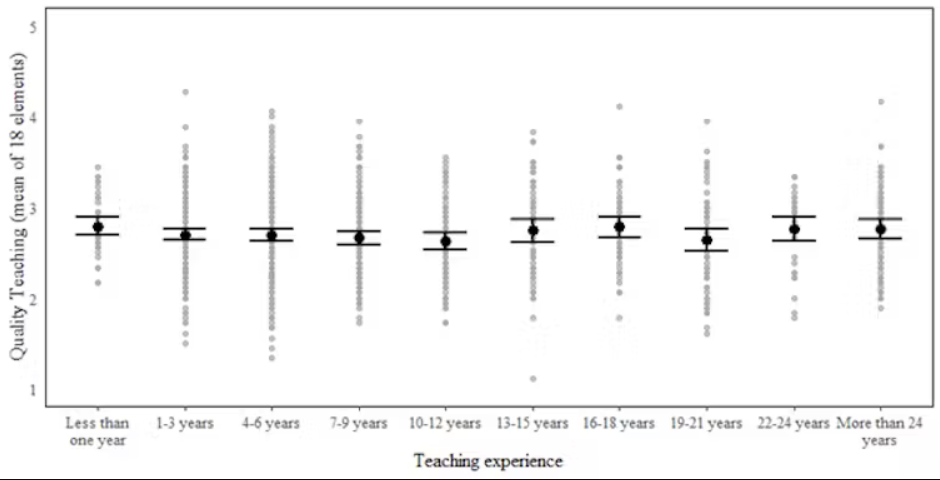Teaching quality is widely acknowledged as the primary, in-school factor influencing student outcomes. Over the past four decades in Australia, more than 100 reviews of initial teacher education have been conducted – almost all reporting persistent concerns about the preparedness of teachers for the classroom.
However, new research presents a compelling alternative perspective on teacher education and early-career teachers. Through direct observation of 990 lessons, we investigated the relationship between years of teaching experience and the quality of teaching, using the Quality Teaching Model.
It found no significant difference between beginning and experienced teachers, which highlights that experience alone is not sufficient to raise teaching quality. This headline result underscores the importance of providing teachers with access to evidence-based, effective PD throughout their careers.
Key Points
-
Initial teacher education (ITE) programs are preparing beginning teachers to deliver quality teaching and have a positive impact in their classrooms right away.
-
On-the-job experience is insufficient on its own to raise teaching quality.
-
Teachers at all career stages can benefit from evidence based, high-impact PD, such as QTR.
The research
This study, by University of Newcastle researchers, drew on data from separate studies conducted during 2014-15 and 2019-21 which involved direct lesson observations analysed and coded using the Quality Teaching (QT) Model. The data set involved observation of 990 entire lessons taught by 512 Year 3 and 4 teachers from 260 New South Wales government schools.
The schools were representative of Australian schools, and the lessons observed included a range of subjects, with the majority in English and Mathematics. Almost three quarters of teachers observed had between one and 15 years of experience, although almost a quarter of the lessons observed were taught by teachers with 16 years’ experience or more.
The findings
The research found no statistically significant differences in average teaching quality across the years of experience categories.
Even when experience categories were broken down in different ways to test for accuracy, the data continued to show that years of experience did not correlate to differences in the quality of teaching delivered.
On the graph, each small dot represents the Quality Teaching score (using a 1-5 coding scale) of an observed lesson. These dots are grouped based on the experience categories.

The average lesson quality in each experience category is represented by the large black dot and the horizontal lines represent the margin of error. The average Quality Teaching score across all the experience categories falls within the same margin of error range, illustrating no statistically significant difference.
"I look at all the young people coming through and I find that an inspiration to keep me developing myself... They’ve got best practice, they’re all up to date with their knowledge and their learning, that’s what inspires me to keep abreast of all the things happening in the [teaching] game at the moment"
– Experienced primary school teacher
What explains these results?
The finding that beginning teachers deliver teaching of a similar quality to that of their more experienced peers is surprising and somewhat counterintuitive. However, it is a finding that has been replicated in other Australian studies. There are at least two possible explanations for this result.
First, the result suggests graduate teachers are entering the profession “classroom ready” which means initial teacher education programs are doing their job – which is not to say further improvements in teaching degrees aren’t possible or warranted.
Second, on-the-job experience is insufficient on its own to raise teaching quality. While experienced teachers make many valuable contributions through leadership and mentoring, it could be that much of the professional development they do over the course of their careers makes little difference to the quality of pedagogy.
Contrary to the prevailing belief that beginning teachers require the most professional development (PD), our findings indicate that teachers at all career stages can benefit from high-impact PD focused on pedagogy such as Quality Teaching Rounds.
"There’s some great young teachers out there who do some amazing things and some things that I could never, ever do, and just to learn from them, and then there’s some things that I can share with them that I’ve learned along the years as well."
– Experienced primary school teacher

